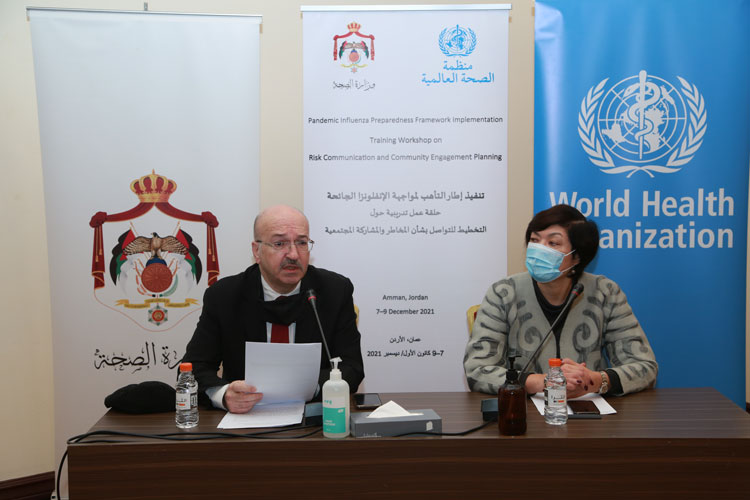 Opening session by Dr Ghazi Faisal Sharkas, Director of Primary Health Care at the Ministry of Health and Dr Chinara Aidyralieva, Coordinator of Public Heath at WHO country office. Photo: WHOCairo, 14 December 2021 – Jordan is currently reviewing and updating its risk communication and community engagement (RCCE) plan for pandemic influenza preparedness based on best practices and lessons learned during the COVID-19 response.
Opening session by Dr Ghazi Faisal Sharkas, Director of Primary Health Care at the Ministry of Health and Dr Chinara Aidyralieva, Coordinator of Public Heath at WHO country office. Photo: WHOCairo, 14 December 2021 – Jordan is currently reviewing and updating its risk communication and community engagement (RCCE) plan for pandemic influenza preparedness based on best practices and lessons learned during the COVID-19 response.
A workshop to review the plan was held between 7 and 9 December 2021 by the Ministry of Health with technical support from the WHO country office in Jordan and the WHO Regional Office for the Eastern Mediterranean. It brought together 35 participants from the Ministry of Health, Ministry of Agriculture, Jordan Food and Drug Administration and Royal Health Awareness Society.
The updated RCCE plan will be integrated into Jordan’s pandemic influenza preparedness and response plan as part of implementation of the global Pandemic Influenza Preparedness (PIP) Framework.
While the global PIP Framework has been in effect since 2011, the COVID-19 pandemic has given it renewed urgency as countries around the world struggle to contain the spread of the respiratory virus and to protect their vulnerable populations from severe disease.
RCCE is a public health intervention that is required throughout the emergency lifecycle during the prevention, preparedness, response and recovery phases of a serious public health event. Its overarching goal is to ensure informed decision-making by listening to the concerns of affected communities and to raise awareness about appropriate protective behaviours through trusted community leaders and relevant communication channels while coordinating with partners.
One of the major lessons learned during the COVID-19 pandemic and other public health emergencies is that RCCE is integral to any successful response to such emergencies. This was made clear during the responses to earlier outbreaks of severe acute respiratory syndrome (SARS), Middle East respiratory syndrome (MERS), influenza A(H1N1) and Ebola virus disease, which all faced new communication challenges while needing to learn from previous experiences.
The COVID-19 pandemic has brought new challenges itself, including misinformation about the disease, its origin and prevention methods, and vaccine hesitancy and rumours about vaccine effectiveness and safety that emerged as part of the “infodemic” that overwhelmed populations with misleading information.
Based on the lessons learned during the COVID-19 response in Jordan and an introduction to the evolving field of infodemic management, workshop participants from the different sectors were trained to use a common language for RCCE while updating Jordan’s pandemic influenza preparedness RCCE plan. Potential challenges facing the implementation of RCCE activities were also discussed and possible solutions identified for the way forward.
Related links
Jordan: First country in the Region to start implementing WHO's Emergency Risk Communication Package


